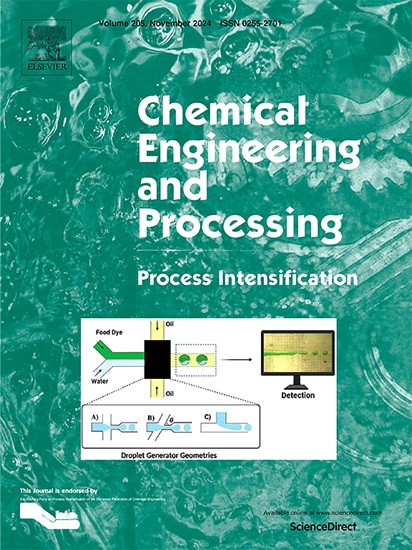Enhancing the extraction of germanium from zinc oxide dust through microwave roasting and the underlying mechanism
IF 3.8
3区 工程技术
Q3 ENERGY & FUELS
Chemical Engineering and Processing - Process Intensification
Pub Date : 2024-11-10
DOI:10.1016/j.cep.2024.110050
引用次数: 0
Abstract
In this study, a microwave roasting-sulfuric acid leaching process was proposed to increase the efficacy of extracting germanium (Ge) from Ge-bearing zinc oxide (ZnO) dust. Microwave energy has a selective cleavage effect on ZnO dust. Proper microwave roasting of Ge-bearing ZnO dust can fracture the ZnO dust, reduce the particle size, increase the particle size uniformity and specific surface area, and transform the phase of Fe4Ge3O12, thus improving the leaching percentage of Ge from the ZnO dust. The optimized conditions were as follows: microwave heating temperature of 290°C, microwave heating time of 5 min, liquid-solid ratio of 6 mL/g, leaching time of 4 h, initial concentration of sulfuric acid of 9 mol/L, and leaching temperature of 60 °C; the leaching percentage of Ge was 84.4 %. In contrast, the leaching percentage of Ge was found to be 62.4 % under the same conditions without roasting. In this study, we described a promising strategy for leaching Ge from ZnO dust via the microwave roasting-sulfuric acid leaching process.
通过微波焙烧提高氧化锌粉尘中锗的提取及其内在机理
本研究提出了一种微波焙烧-硫酸浸出工艺,以提高从含锗氧化锌(ZnO)粉尘中提取锗(Ge)的效率。微波能对氧化锌粉尘具有选择性裂解作用。对含Ge的氧化锌粉尘进行适当的微波焙烧可以使氧化锌粉尘破裂,减小粒度,增加粒度均匀性和比表面积,并使Fe4Ge3O12相发生转变,从而提高氧化锌粉尘中Ge的浸出率。优化条件如下:微波加热温度为 290°C,微波加热时间为 5 分钟,液固比为 6 mL/g,浸出时间为 4 h,硫酸初始浓度为 9 mol/L,浸出温度为 60°C;Ge 的浸出率为 84.4%。相比之下,在相同条件下,未经焙烧的 Ge 浸出率为 62.4%。在这项研究中,我们介绍了一种通过微波焙烧-硫酸浸出工艺从氧化锌粉尘中浸出 Ge 的可行策略。
本文章由计算机程序翻译,如有差异,请以英文原文为准。
求助全文
约1分钟内获得全文
求助全文
来源期刊
CiteScore
7.80
自引率
9.30%
发文量
408
审稿时长
49 days
期刊介绍:
Chemical Engineering and Processing: Process Intensification is intended for practicing researchers in industry and academia, working in the field of Process Engineering and related to the subject of Process Intensification.Articles published in the Journal demonstrate how novel discoveries, developments and theories in the field of Process Engineering and in particular Process Intensification may be used for analysis and design of innovative equipment and processing methods with substantially improved sustainability, efficiency and environmental performance.

 求助内容:
求助内容: 应助结果提醒方式:
应助结果提醒方式:


